Hystrix
简介
Hystix,即熔断器。
主页:https://github.com/Netflix/Hystrix/

Hystrix是Netflix开源的一个延迟和容错库,用于隔离访问远程服务、第三方库,防止出现级联失败。
使用熔断器Hystrix为了优化项目。
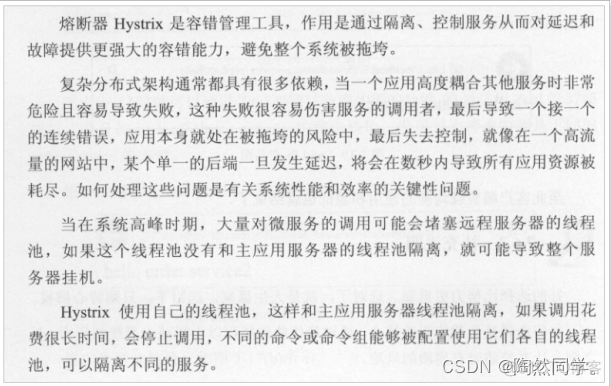
熔断器的工作机制
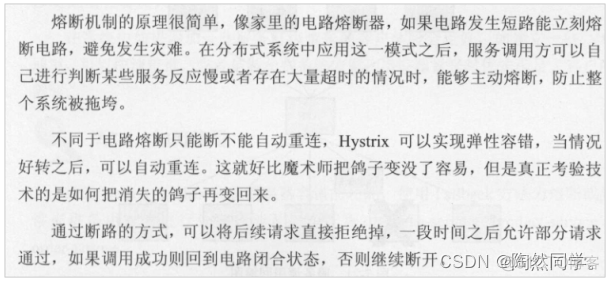
正常工作的情况下,客户端请求调用服务API接口:
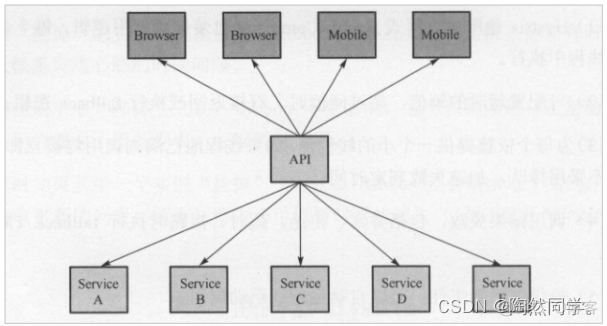
当有服务出现异常时,直接进行失败回滚,00000000处理:
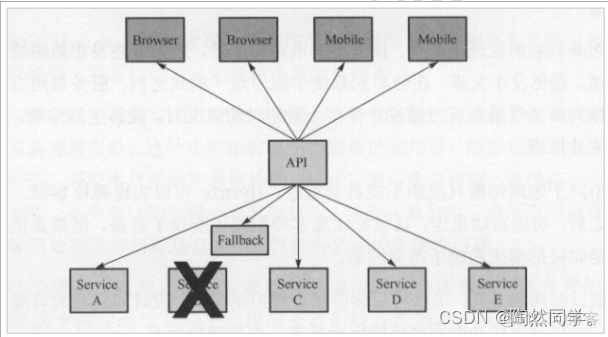
当服务繁忙时,如果服务出现异常,不是粗暴的直接报错,而是返回一个友好的提示,虽然拒绝了用户的访问,但是会返回一个结果。
这就好比去买鱼,平常超市买鱼会额外赠送杀鱼的服务。等到逢年过节,超时繁忙时,可能就不提供杀鱼服务了,这就是服务的降级。
系统特别繁忙时,一些次要服务暂时中断,优先保证主要服务的畅通,一切资源优先让给主要服务来使用,在双十一、618时,京东天猫都会采用这样的策略。
动手实践
引入依赖
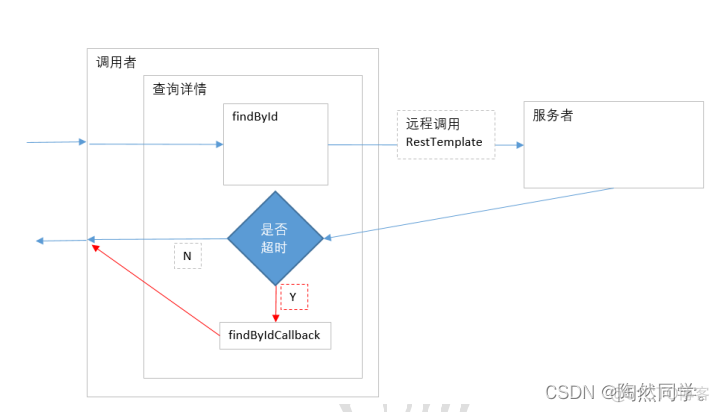
首先在student-service中引入Hystrix依赖:
<dependency><groupId>org.springframework.cloud</groupId>
<artifactId>spring-cloud-starter-netflix-hystrix</artifactId>
</dependency>

开启熔断
在启动类上添加注解 “@EnableHystrix”
package com.czxy;import org.springframework.boot.SpringApplication;
import org.springframework.boot.autoconfigure.SpringBootApplication;
import org.springframework.cloud.netflix.eureka.EnableEurekaClient;
import org.springframework.cloud.netflix.hystrix.EnableHystrix;
@SpringBootApplication
@EnableEurekaClient
@EnableHystrix //开启熔断器
public class StudentApplication {
public static void main(String[] args) {
SpringApplication.run(StudentApplication.class,args);
}
}
改造调用方
我们改造student-service,修改ClassesDao的findAll方法,并且声明一个失败时的回滚处理函数dataFallback:
package com.czxy.dao;import com.netflix.hystrix.contrib.javanica.annotation.HystrixCommand;
import com.netflix.hystrix.contrib.javanica.annotation.HystrixProperty;
import org.springframework.http.ResponseEntity;
import org.springframework.stereotype.Repository;
import org.springframework.web.bind.annotation.GetMapping;
import org.springframework.web.client.RestTemplate;
import javax.annotation.Resource;
import java.util.ArrayList;
import java.util.List;
@Repository
public class ClassesDao {
@Resource
private RestTemplate restTemplate;
@GetMapping
@HystrixCommand(fallbackMethod = "findAllFallback")
public List<String> findAll(){
ResponseEntity<List> entity = restTemplate.getForEntity("http://classes-service/classes", List.class);
List<String> list = entity.getBody();
return list;
}
/**
* 失败时的回调函数
* @return
*/
public List<String> findAllFallback(){
List<String> list = new ArrayList<>();
list.add("模拟数据1");
list.add("模拟数据2");
list.add("模拟数据3");
return list;
}
}
- @HystrixCommand(fallbackMethod="dataFallback"):声明一个失败回滚处理函数dataFallback,当findAll执行超时(默认是1000毫秒),就会执行fallback函数,返回替代内容。
- 为了方便查看熔断的触发时机,我们记录请求访问时间。
- 多学一招:通过@HystrixCommand的commandProperties 可以设置默认时间
// HystrixCommandProperties Hystrix命令参数配置类
@HystrixCommand(fallbackMethod = "dataFallback",commandProperties = @HystrixProperty(name="execution.isolation.thread.timeoutInMilliseconds",value="1000"))
改造服务提供者
改造服务提供者classes_service,随机休眠一段时间,以触发熔断:
package com.czxy.controller;import org.springframework.web.bind.annotation.GetMapping;
import org.springframework.web.bind.annotation.RequestMapping;
import org.springframework.web.bind.annotation.RestController;
import javax.annotation.Resource;
import javax.servlet.http.HttpServletRequest;
import java.util.ArrayList;
import java.util.List;
import java.util.Random;
@RestController
@RequestMapping("/classes")
public class ClassesController {
@Resource
private HttpServletRequest request;
@GetMapping
public List<String> findAll() throws InterruptedException {
// 模拟网络延迟
Thread.sleep(new Random().nextInt(2000));
List<String> list = new ArrayList<>();
list.add("Java12班");
list.add("Java34班");
list.add("服务端端口:" + request.getServerPort());
return list;
}
}
改造StudentController,记录执行时间
package com.czxy.controller;import com.czxy.service.StudentService;
import org.springframework.web.bind.annotation.GetMapping;
import org.springframework.web.bind.annotation.RequestMapping;
import org.springframework.web.bind.annotation.RestController;
import javax.annotation.Resource;
import java.util.List;
/**
* @author 桐叔
* @email liangtong@itcast.cn
*/
@RestController
@RequestMapping("/student")
public class StudentController {
@Resource
private StudentService studentService;
@GetMapping
public List<String> findAll(){
long start = System.currentTimeMillis();
List<String> list = studentService.findAll();
long end = System.currentTimeMillis();
list.add("耗时:" + (end-start));
return list;
}
}
启动测试
启动服务
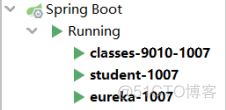
如果超过1秒将使用“模拟数据”
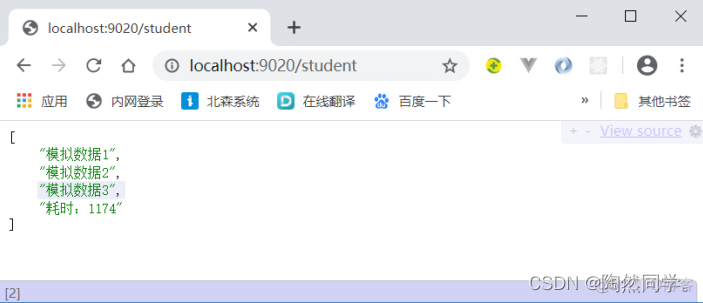
如果没有超过1秒,将使用查询结果的数据
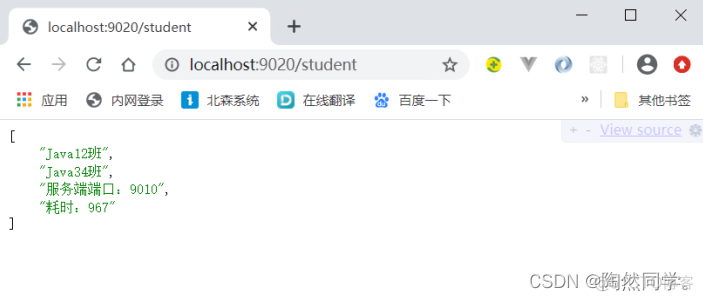
面试题
如果熔断和重试机制,都配置,是都生效?还是某个生效?
经测试发现是熔断生效,为什么?
1. Ribbon重试机制的超时时间设置的是1000ms:
2.Hystix的超时时间默认也是1000ms
3.实际执行后发现,没有触发重试机制,而是先触发了熔断。
我们可以通过hystrix.command.default.execution.isolation.thread.timeoutInMilliseconds来设置
# Hystrix超时时间。hystrix:
command:
default:
execution:
isolation:
thread:
timeoutInMilliseconds: 3000 # 设置hystrix的超时时间为3000ms
Feign
在前面的学习中,我们使用了Ribbon的负载均衡功能,大大简化了远程调用时的代码:
restTemplate.getForEntity("http://classes-service/classes", List.class);
如果就学到这里,你可能以后需要编写类似的大量重复代码,格式基本相同,无非参数不一样。有没有更优雅的方式,来对这些代码再次优化呢?
这就是我们接下来要学的Feign的功能了。
简介
Feign是一种声明式、模板化的HTTP客户端。
在SpringCloud中使用Feign,我们可以做到使用HTTP请求远程服务时能与调用本地方法一样的编码体验,开发者完全感知不到这是远程方法,更感知不到这是个HTTP请求。
快速入门
导入依赖
<dependency><groupId>org.springframework.cloud</groupId>
<artifactId>spring-cloud-starter-openfeign</artifactId>
</dependency>
开启Feign功能
我们在启动类上,添加注解 @EnableFeignClients,开启Feign功能
package com.czxy;import org.springframework.boot.SpringApplication;
import org.springframework.boot.autoconfigure.SpringBootApplication;
import org.springframework.cloud.netflix.eureka.EnableEurekaClient;
import org.springframework.cloud.netflix.hystrix.EnableHystrix;
import org.springframework.cloud.openfeign.EnableFeignClients;
@SpringBootApplication
@EnableEurekaClient
@EnableHystrix //开启熔断器
@EnableFeignClients //开启feign
public class StudentApplication {
public static void main(String[] args) {
SpringApplication.run(StudentApplication.class,args);
}
}
Feign的客户端
步骤一:编写 ClassesFeign
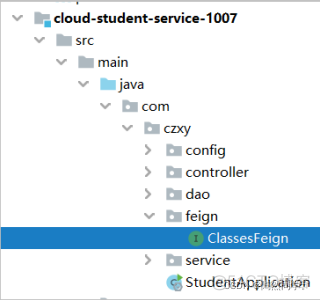
import org.springframework.cloud.openfeign.FeignClient;
import org.springframework.web.bind.annotation.GetMapping;
import java.util.List;
@FeignClient(value="classes-service",path="/classes")
public interface ClassesFeign {
@GetMapping
public List<String> findAll();
}
修改StudentService,不再调用ClassesDao,直接使用
package com.czxy.service;import com.czxy.dao.ClassesDao;
import com.czxy.feign.ClassesFeign;
import org.springframework.stereotype.Service;
import javax.annotation.Resource;
import java.util.List;
@Service
public class StudentService {
// @Resource
// private ClassesDao classesDao;
@Resource
private ClassesFeign classesFeign;
public List<String> findAll() {
// return classesDao.findAll();
return classesFeign.findAll();
}
}
启动测试
正常访问
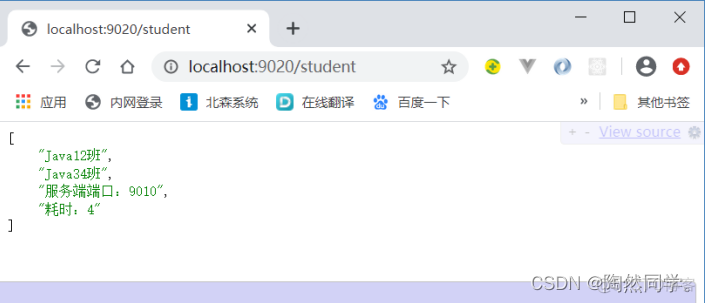
如果超时,抛异常
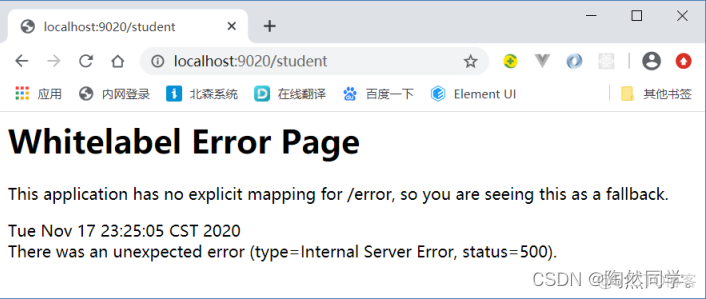
入门总结
第一步:导入Feign依赖
第二步:在StudentApplication启动类添加 @EnableFeginClients
第三步:编写Feign客户端 使用@FeignClient声明客户端 参数:value设置服务名称 path设置路径前缀(也就是controller配置的路径)
第四步:在controller中使用Feign客户端发起远程请求调用
负载均衡
之前使用RestTemplate进行远程调用时,需要添加额外注解来完成负载均衡处理。
Feign中本身已经集成了Ribbon依赖,不需要额外引入依赖,就可以完成负载均衡处理。采用之前的配置就可以。
classes-service:ribbon:
ConnectTimeout: 250 # Ribbon的连接超时时间
ReadTimeout: 1000 # Ribbon的数据读取超时时间
OkToRetryOnAllOperations: true # 是否对所有操作都进行重试
MaxAutoRetriesNextServer: 1 # 切换实例的重试次数
MaxAutoRetries: 1 # 对当前实例的重试次数
另外,还可以使用ribbon.xx来进行ribbon的全局配置。
Hystrix支持
Feign默认也有对Hystix的集成,只不过,默认情况下是关闭的。
我们需要通过下面的参数来开启:
feign:hystrix:
enabled: true # 开启Feign的熔断功能
但是,Feign中的Fallback配置不像Ribbon中那样简单了。
首先,我们要定义一个类,实现DataFeign接口,作为fallback的处理类
package com.czxy.feign;import org.springframework.stereotype.Component;
import java.util.ArrayList;
import java.util.List;
email liangtong@itcast.cn
@Component
public class ClassesFeignFallback implements ClassesFeign {
@Override
public List<String> findAll() {
List<String> list = new ArrayList<>();
list.add("模拟数据111");
list.add("模拟数据222");
list.add("模拟数据333");
return list;
}
}
然后在DataFeign中,指定刚才编写的实现类
package com.czxy.feign;import org.springframework.cloud.openfeign.FeignClient;
import org.springframework.web.bind.annotation.GetMapping;
import java.util.List;
@FeignClient(value="classes-service",path="/classes" ,fallback = ClassesFeignFallback.class )
public interface ClassesFeign {
@GetMapping
public List<String> findAll();
}
重启测试:
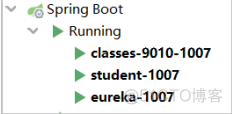
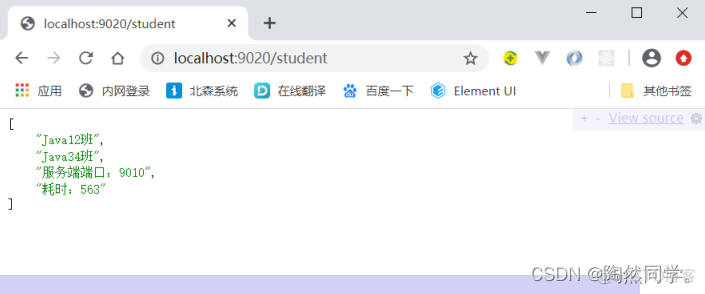
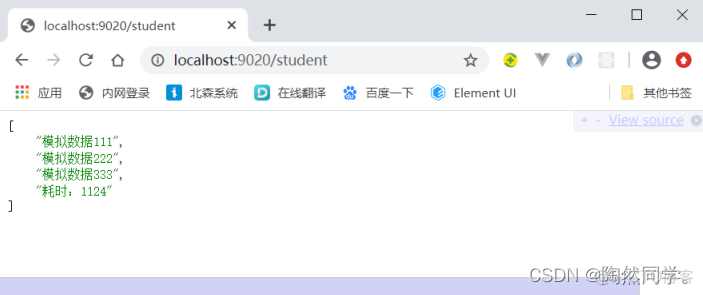
请求压缩(了解)
Spring Cloud Feign 支持对请求和响应进行GZIP压缩,以减少通信过程中的性能损耗。通过下面的参数即可开启请求与响应的压缩功能:
feign:compression:
request:
enabled: true # 开启请求压缩
response:
enabled: true # 开启响应压缩
同时,我们也可以对请求的数据类型,以及触发压缩的大小下限进行设置:
feign:compression:
request:
enabled: true # 开启请求压缩
mime-types: text/html,application/xml,application/json # 设置压缩的数据类型
min-request-size: 2048 # 设置触发压缩的大小下限
注:上面的数据类型、压缩大小下限均为默认值。
日志级别(了解)
前面讲过,通过logging.level.xx=debug来设置日志级别。然而这个对Fegin客户端而言不会产生效果。因为@FeignClient注解修改的客户端在被代理时,都会创建一个新的Fegin.Logger实例。我们需要额外指定这个日志的级别才可以。
设置com.czxy包下的日志级别都为debug
logging:level:
com:
czxy:
feign: debug
编写配置类,定义日志级别
package com.czxy.config;import feign.Logger;
import org.springframework.context.annotation.Bean;
import org.springframework.context.annotation.Configuration;
@Configuration
public class FeignConfig {
@Bean
public Logger.Level feignLoggerLevel(){
return Logger.Level.FULL;
}
}
这里指定的Level级别是FULL,Feign支持4种级别:
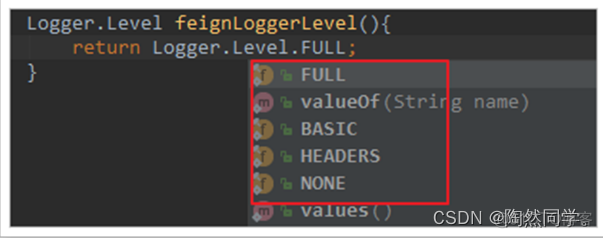
- NONE:不记录任何日志信息,这是默认值。
- BASIC:仅记录请求的方法,URL以及响应状态码和执行时间
- HEADERS:在BASIC的基础上,额外记录了请求和响应的头信息
- FULL:记录所有请求和响应的明细,包括头信息、请求体、元数据。
在FeignClient中指定配置类:
/*** Created by liangtong.
*/
@FeignClient(value="service",path="/test",fallback = DataFeignFallback.class,configuration = FeignConfig.class)
public interface DataFeign {
@GetMapping
public ResponseEntity<String> test();
}
重启项目,即可看到每次访问的日志:
Zull网关
简介
官网:https://github.com/Netflix/zuul

Zuul:维基百科:
电影《捉鬼敢死队》中的怪兽,Zuul,在纽约引发了巨大骚乱。
事实上,在微服务架构中,Zuul就是守门的大Boss!一夫当关,万夫莫开!
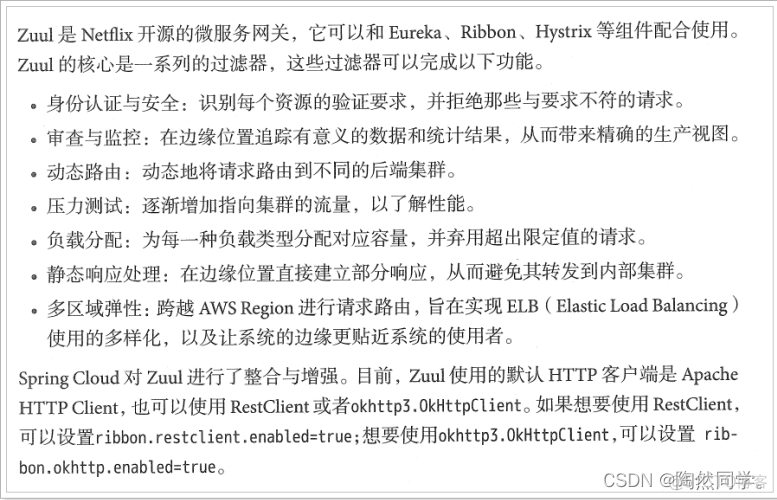
Zull加入后的框架
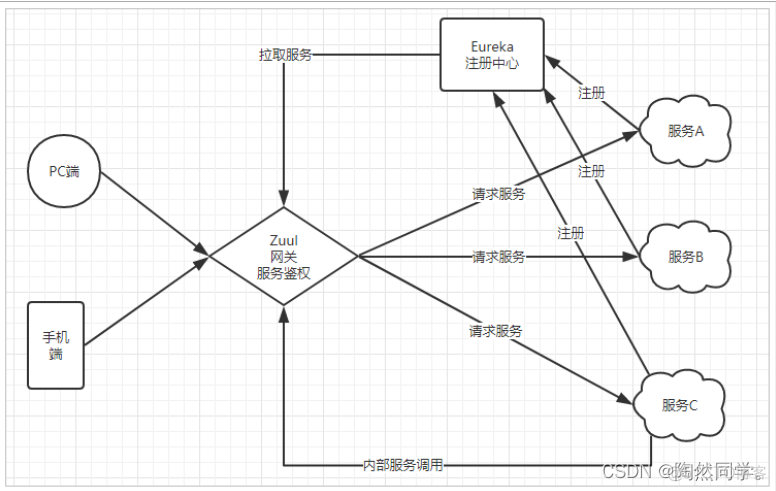
- 不管是来自于客户端(PC或移动端)的请求,还是服务内部调用。一切对服务的请求都会经过Zuul这个网关,然后再由网关来实现 鉴权、动态路由等等操作。Zuul就是我们服务的统一入口。
快速入门--路由转发
新建工程
创建项目:cloud-zuul-1007
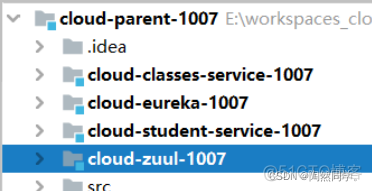
添加坐标
<dependencies><dependency>
<groupId>org.springframework.cloud</groupId>
<artifactId>spring-cloud-starter-netflix-zuul</artifactId>
</dependency>
<dependency>
<groupId>org.springframework.boot</groupId>
<artifactId>spring-boot-starter-test</artifactId>
</dependency>
</dependencies>
编写启动类
通过@EnableZuulProxy注解开启Zuul的功能:
package com.czxy;import org.springframework.boot.SpringApplication;
import org.springframework.boot.autoconfigure.SpringBootApplication;
import org.springframework.cloud.netflix.zuul.EnableZuulProxy;
@SpringBootApplication
@EnableZuulProxy
public class ZuulApplication {
public static void main(String[] args) {
SpringApplication.run(ZuulApplication.class,args);
}
}
编写配置
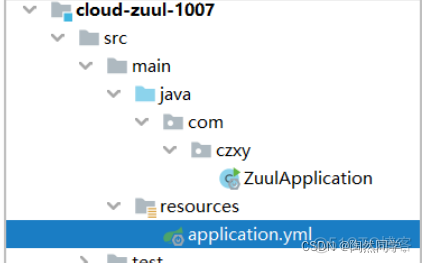
server:
port: 10010
# 服务名
spring:
application:
name: zuul
编写路由规则
我们需要用Zuul来代理classes-service服务,先看一下控制面板中的服务状态:
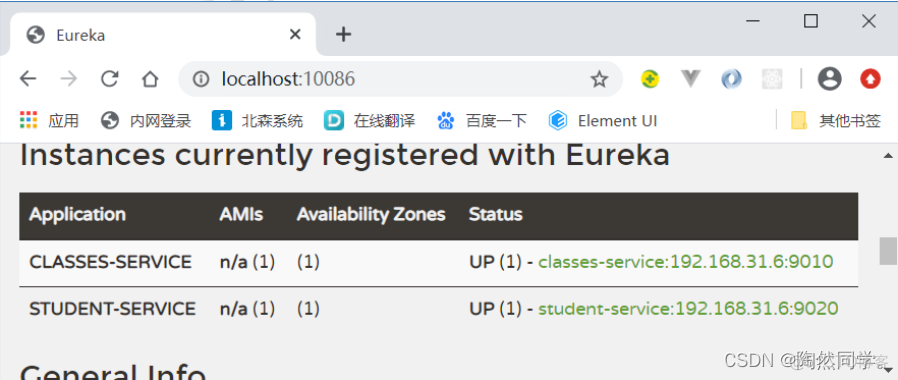
- ip为:127.0.0.1
- 端口为:9010
映射规则:
zuul:routes:
service:
path: /service/**
url: http://localhost:9010
zuul.routes.服务名.path= /前缀/**
zull.routers.服务名.url= 路径
我们将符合path 规则的一切请求,都代理到 url参数指定的地址
启动测试
访问的路径中需要加上配置规则的映射路径,我们访问:
http://localhost:10010/service/classes
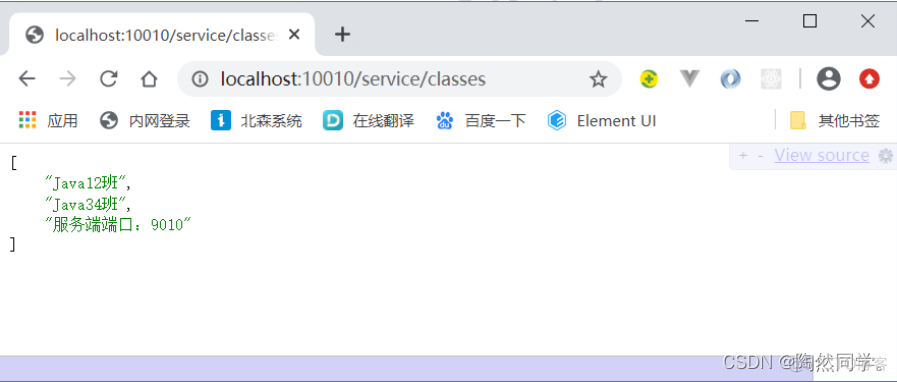
面向服务的路由
在刚才的路由规则中,我们把路径对应的服务地址写死了!如果同一服务有多个实例的话,这样做显然就不合理了。
我们应该根据服务的名称,去Eureka注册中心查找 服务对应的所有实例列表,然后进行动态路由才对!
添加Eureka客户端依赖
<!--添加eureka客户端--><dependency>
<groupId>org.springframework.cloud</groupId>
<artifactId>spring-cloud-starter-netflix-eureka-client</artifactId>
</dependency>
开启Eureka客户端发现功能
package com.czxy;import org.springframework.boot.SpringApplication;
import org.springframework.boot.autoconfigure.SpringBootApplication;
import org.springframework.cloud.netflix.eureka.EnableEurekaClient;
import org.springframework.cloud.netflix.zuul.EnableZuulProxy;
@SpringBootApplication
@EnableZuulProxy //开启zuul代理
@EnableEurekaClient //开启eureka客户端
public class ZuulApplication {
public static void main(String[] args) {
SpringApplication.run(ZuulApplication.class,args);
}
}
添加Eureka配置 获取服务信息
#eureka配置eureka:
client:
service-url:
defaultZone: http://localhost:10086/eureka
registry-fetch-interval-seconds: 5
instance:
prefer-ip-address: true #是否注册ip地址
ip-address: 127.0.0.1 #注册的IP地址
修改映射配置 通过服务名获取
因为已经有了Eureka客户端,我们可以从Eureka获取服务的地址信息,因此映射时无需指定IP地址,而是通过服务名称来访问
#路由配置zuul:
routes:
service:
path: /service/** #zuul拦截的路径
# url: http://localhost:9010
serviceId: service #将要访问的服务名
启动测试
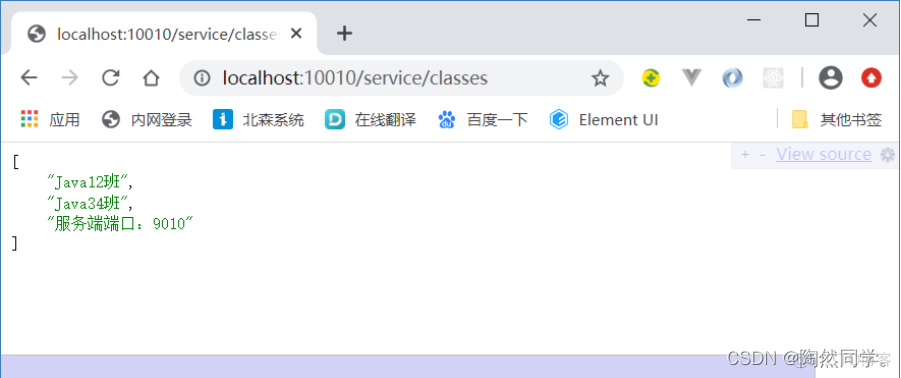
简化的路由配置
在刚才的配置中,我们的规则是这样的:
- zuul.routes.<route>.path=/xxx/**: 来指定映射路径。<route>是自定义的路由名
- zuul.routes.<route>.serviceId=service:来指定服务名。
而大多数情况下,我们的<route>路由名称往往和 服务名会写成一样的。因此Zuul就提供了一种简化的配置语法:zuul.routes.<serviceId>=<path>
比方说上面我们关于user-service的配置可以简化为一条:
# zuul 网关配置路由配置zuul:
routes:
classes-service: /classes-service/**
省去了对服务名称的配置。
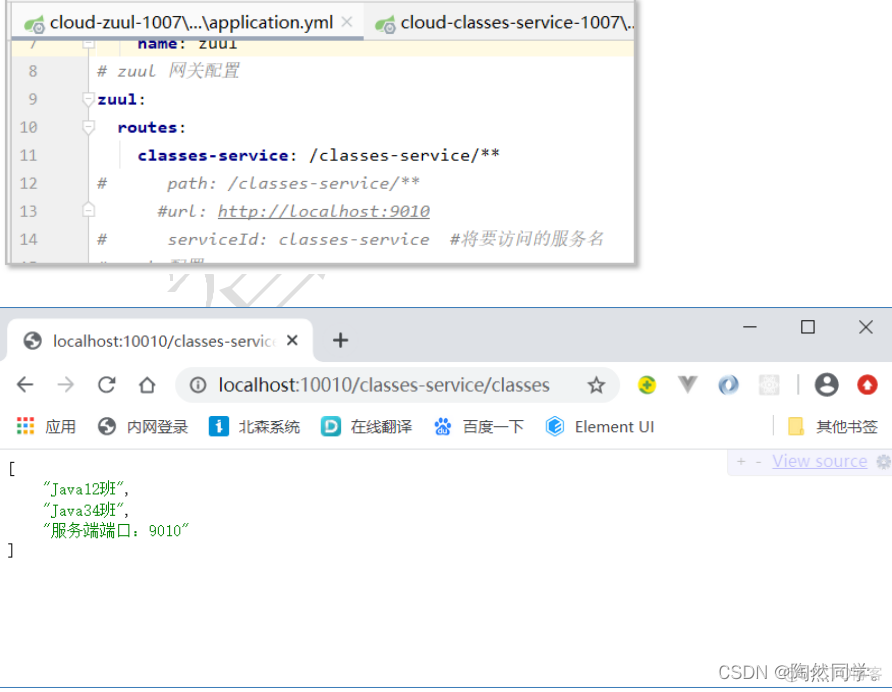
默认的路由规则
在使用Zuul的过程中,上面讲述的规则已经大大的简化了配置项。但是当服务较多时,配置也是比较繁琐的。因此Zuul就指定了默认的路由规则:
- 默认情况下,一切服务的映射路径就是服务名本身。
- 例如服务名为:service,则默认的映射路径就是:/service/**
也就是说,刚才的映射规则我们完全不配置也是OK的,不信就试试看
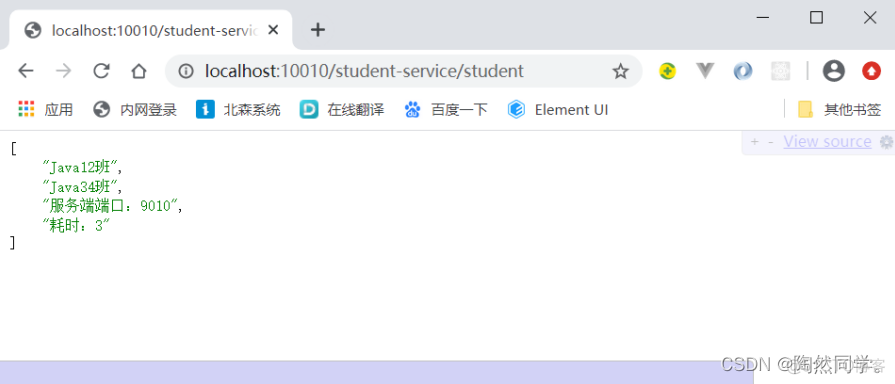
路由前缀
配置示例:
#路由配置zuul:
prefix: /api
routes:
service: /service/** #zuul拦截的路径
我们通过zuul.prefix=/api来指定了路由的前缀,这样在发起请求时,路径就要以/api开头。
路径/api/student-service/student将会被代理到/student-service/student
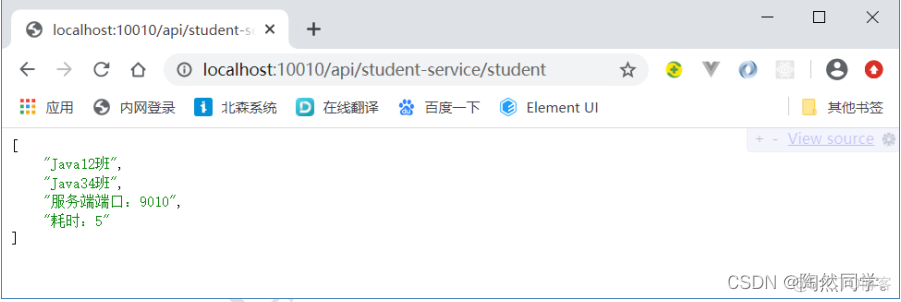
过滤器
Zuul作为网关的其中一个重要功能,就是实现请求的鉴权。而这个动作我们往往是通过Zuul提供的过滤器来实现的。
ZullFilter
ZuulFilter是过滤器的顶级父类。在这里我们看一下其中定义的4个最重要的方法:
public abstract ZuulFilter implements IZuulFilter{
abstract public String filterType(); //过滤器类型
abstract public int filterOrder(); //执行顺序
boolean shouldFilter(); //是否需要执行
Object run() throws ZuulException; //具体业务逻辑
}
- shouldFilter:返回一个Boolean值,判断该过滤器是否需要执行。返回true执行,返回false不执行。
- run:过滤器的具体业务逻辑。
- filterType:返回字符串,代表过滤器的类型。包含以下4种:
- pre:请求在被路由之前执行
- routing:在路由请求时调用
- post:在routing和errror过滤器之后调用
- error:处理请求时发生错误调用
- filterOrder:通过返回的int值来定义过滤器的执行顺序,数字越小优先级越高。
过滤器执行生命周期
这张是Zuul官网提供的请求生命周期图,清晰的表现了一个请求在各个过滤器的执行顺序。
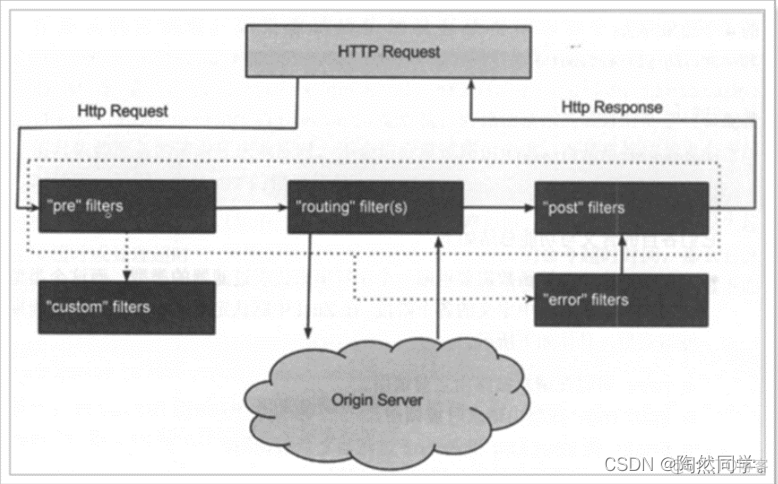
- 正常流程:
请求到达首先会经过pre类型过滤器,而后到达routing类型,进行路由,请求就到达真正的服务提供者,执行请求,返回结果后,会到达post过滤器。而后返回响应。
- 异常流程:
- 整个过程中,pre或者routing过滤器出现异常,都会直接进入error过滤器,再error处理完毕后,会将请求交给POST过滤器,最后返回给用户。
- 如果是error过滤器自己出现异常,最终也会进入POST过滤器,而后返回。
- 如果是POST过滤器出现异常,会跳转到error过滤器,但是与pre和routing不同的时,请求不会再到达POST过滤器了。
所有内置过滤器列表:
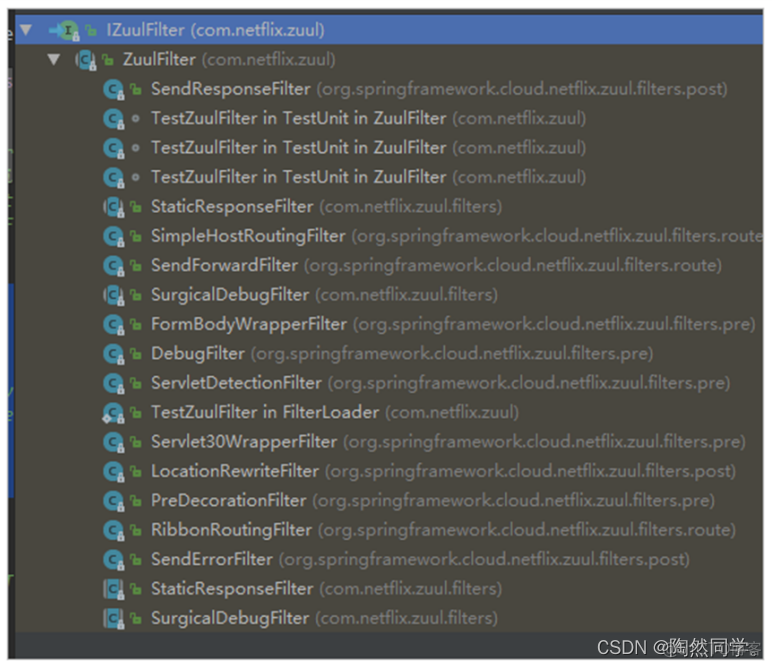
使用场景
场景非常多:
- 请求鉴权:一般放在pre类型,如果发现没有访问权限,直接就拦截了
- 异常处理:一般会在error类型和post类型过滤器中结合来处理。
服务调用时长统计:pre和post结合使用。
自定义过滤器
接下来我们来自定义一个过滤器,模拟一个登录的校验。基本逻辑:如果请求中有authorization请求头,则认为请求有效,放行。
定义过滤器类
package com.czxy.filter;import com.netflix.zuul.ZuulFilter;
import com.netflix.zuul.context.RequestContext;
import com.netflix.zuul.exception.ZuulException;
import org.springframework.http.HttpStatus;
import javax.servlet.http.HttpServletRequest;
/**
* Created by liangtong.
*/
@Component
public class LoginFilter extends ZuulFilter {
@Override
public String filterType() {
return "pre"; //路由之前执行
}
@Override
public int filterOrder() {
return 1; //排序
}
@Override
public boolean shouldFilter() {
return true; //是否进行过滤,true将执行run()方法
}
@Override
public Object run() throws ZuulException {
//1 获得上下文对象
RequestContext requestContext = RequestContext.getCurrentContext();
//2 获得请求对象
HttpServletRequest request = requestContext.getRequest();
//3 获得指定的请求头
String token = request.getHeader("authorization");
//如果没有token返回401
if(token == null || "".equals(token)) {
requestContext.setSendZuulResponse(false);
requestContext.setResponseStatusCode(HttpStatus.UNAUTHORIZED.value());
}
return null;
}
}
测试
没有token

有token
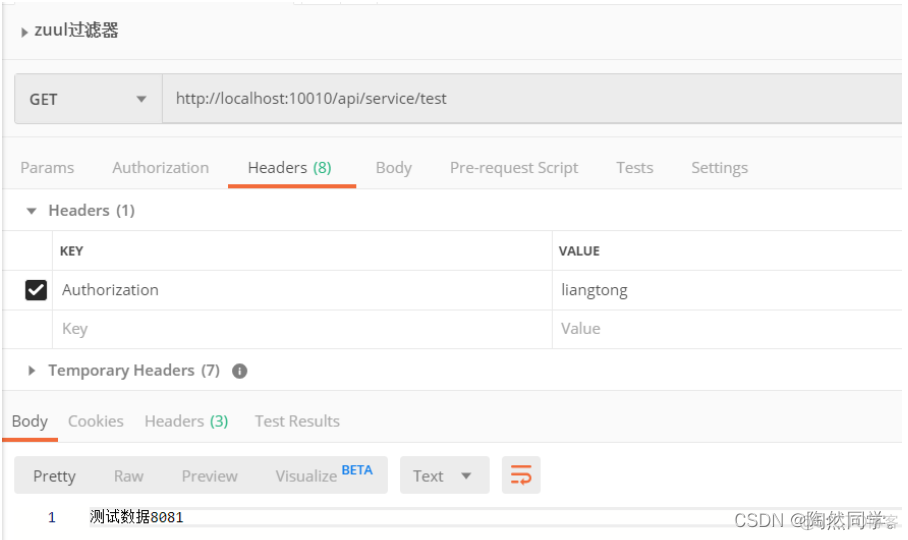
负载均衡和熔断
Zuul中默认就已经集成了Ribbon负载均衡和Hystix熔断机制。但是所有的超时策略都是走的默认值,比如熔断超时时间只有1S,很容易就触发了。因此建议我们手动进行配置:

zuul:
retryable: true #开启重试(注意:检查之前是否配置zuul,如果配置需要合并配置项)
#全局负载均衡配置
ribbon:
ConnectTimeout: 250 # 连接超时时间(ms)
ReadTimeout: 2000 # 通信超时时间(ms)
OkToRetryOnAllOperations: true # 是否对所有操作重试
MaxAutoRetriesNextServer: 2 # 同一服务不同实例的重试次数
MaxAutoRetries: 1 # 同一实例的重试次数
#熔断
hystrix:
command:
default:
execution:
isolation:
thread:
timeoutInMillisecond: 6000 # 熔断超时时长:6000ms
